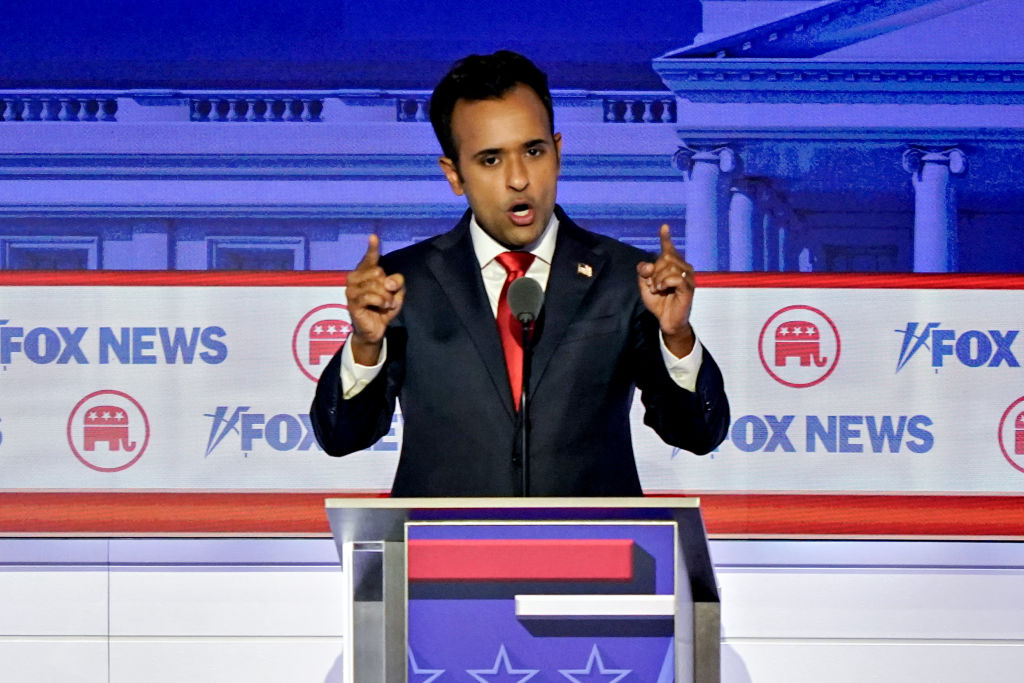
Vivek Ramaswamy, the entrepreneur turned politician, constructed his climate comment at last week’s Republican debate very precisely. “The climate agenda is a hoax,” he said to the raucous audience. For years, many Republicans, most notably Donald Trump, have claimed that climate change is a hoax. Inserting the word “agenda” into the once-common GOP refrain, may seem minor, but it represents a significant evolution.
The signals of climate change have become increasingly present—think of the record-setting extreme heat and near-constant flooding—and leading Republicans can no longer feasibly deny that climate change is happening. Indeed, it’s happening in the backyards of Republican and Democratic voters alike.
Instead, the GOP has begun to accept that it is happening while rejecting solutions aimed at slowing it down. During the debate, Ramaswamy suggested that costs of addressing climate change were greater than the effects of climate change itself. In a CNN interview afterward, he said, we should just focus on technological fixes to acclimate instead of paying to address any root causes of climate change. “We should focus on adaptation,” he said.
It would be easy to write Ramaswamy's comments off as errant talking points with minimal political and policy implications. After all, he has never been elected to public office and at this moment has no policy making authority. But Ramaswamy is not alone. His comments align with a growing rhetorical convention among right-wing politicians. And those comments tap into a powerful populist undercurrent that poses a challenge to climate policy in the U.S. and around the world.
More From TIME
It’s worth unpacking Ramaswamy’s debate comments in greater depth. He started by declaring, brashly, that the “the climate agenda is a hoax” and then followed up saying that the “anti-carbon agenda is the wet blanket on our economy.” He concluded arguing that “the reality is more people are dying of bad climate change policies than they are of actual climate change.”
Ramaswamy makes clear from the jump that he opposes climate policy, but nowhere does he actually deny that human behavior is contributing to climate change. Indeed, by talking about the “agenda” rather than climate change itself he tacitly acknowledges the reality of climate change, or at the very least that the old positioning of climate change as a hoax is no longer apt. In interviews following the debate, he twisted climate science, but he didn’t deny the phenomenon of climate change even when given multiple opportunities to do so.
But Ramaswamy did have a lot to say about the validity of the “agenda,” presumably referring to policies being implemented by the Biden Administration to slow emissions. Ramaswamy’s argument has an obvious political logic to it. Polling shows that the vast majority of Americans know very little about the Inflation Reduction Act and other Biden climate policies. And while Americans increasingly view climate change as a threat, they rank it far below economic concerns. Indeed, one poll released earlier this year showed that only 38% of Americans would be willing to pay a $1 per month carbon fee to address climate change.
In short, for many voters, fear of a weak economy will outweigh fears over climate change. By branding climate policy as an economic downer, he and others can poison the well for any future climate policy.
Ramaswamy is far from alone. Last year, I wrote about a very similar approach employed by Florida Gov. Ron DeSantis. Florida has huge climate problems, including hurricanes and persistent flooding. But instead of talking about the root causes, DeSantis has funded a range of adaptation programs to help Band-aid the problem. "People, when they start talking about things like ‘global warming,’ they typically use that as a pretext to do a bunch of left-wing things that they would want to do anyways,” DeSantis said at a press conference in 2021. “We’re not doing any left-wing stuff. What we’re doing though, is just reacting to the fact that okay, we’re a flood-prone state.”
More From TIME
In the San Diego area last year, I visited a blue suburb that elected a Trump-supporting city councilor who ran solely on her opposition to a fee that would charge drivers for their miles traveled. Local officials had pushed the policy as more people drove electric cars, thereby avoiding paying the gas tax. But it proved to be a lightning rod and a conservative-led backlash forced local officials to rethink the policy.
Ramaswamy’s emergence on the U.S. political stage has come about, at least in part, because he knows how to ruffle feathers and communicate with the GOP base. It would be wise to consider that, with his rhetoric, he may be tapping into a feeling that will resonate with at least some slice of the electorate.
More Must-Reads from TIME
- Why Biden Dropped Out
- Ukraine’s Plan to Survive Trump
- The Rise of a New Kind of Parenting Guru
- The Chaos and Commotion of the RNC in Photos
- Why We All Have a Stake in Twisters’ Success
- 8 Eating Habits That Actually Improve Your Sleep
- Welcome to the Noah Lyles Olympics
- Get Our Paris Olympics Newsletter in Your Inbox
Write to Justin Worland at justin.worland@time.com